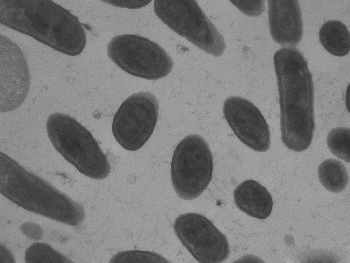
Listeria monocytogenes as seen under an electron
microscope. The photo was taken with a transmission
electron microscope at the microscopy unit of the UFS.
Bacteriophages (lollipop-like structures) can be seen
next to the bacterial cells.
Photo: Supplied
“The aim of my project was to identify and characterise the contamination problem in an avocado-processing facility and then to find a solution,” said Dr Amy Strydom, postdoctoral fellow in the Department of Microbial Biochemical and Food Biotechnology at the University of the Free State (UFS).
Her PhD, “Control of Listeria monocytogenes in an Avocado-processing Facility”, aimed to identify and characterise the contamination problem in a facility where avocados were processed into guacamole. Dr Strydom completed her MSc in food science in 2009 at Stellenbosch University and this was the catalyst for her starting her PhD in microbiology in 2012 at the UFS. The research was conducted over a period of four years and she graduated in 2016. The research project was funded by the National Research Foundation.
The opportunity to work closely with the food industry further motivated Dr Strydom to conduct her research. The research has made a significant contribution to a food producer (avocado facility) that will sell products that are not contaminated with any pathogens. The public will then buy food that is safe for human consumption.
What is Listeria monocytogenes?
Listeria monocytogenes is a food-borne pathogenic bacterium. When a food product is contaminated with L. monocytogenes, it will not be altered in ways that are obvious to the consumer, such as taste and smell. When ingested, however, it can cause a wide range of illnesses in people with impaired immune systems. “Risk groups include newborn babies, the elderly, and people suffering from diseases that weaken their immune systems,” Dr Strydom said. The processing adjustments based on her findings resulted in decreased numbers of Listeria in the facility.
The bacteria can also survive and grow at refrigeration temperatures, making them dangerous food pathogens, organisms which can cause illnesses [in humans]. Dr Strydom worked closely with the facility and developed an in-house monitoring system by means of which the facility could test their products and the processing environment. She also evaluated bacteriophages as a biological control agent in the processing facility. Bacteriophages are viruses that can only infect specific strains of bacteria. Despite bacteriophage products specifically intended for the use of controlling L. monocytogenes being commercially available in the food industry, Dr Strydom found that only 26% of the L. monocytogenes population in the facility was destroyed by the ListexP100TM product. “I concluded that the genetic diversity of the bacteria in the facility was too high and that the bacteriophages could not be used as a control measure. However, there is much we do not understand about bacteriophages, and with a few adjustments, we might be able to use them in the food industry.”
Microbiological and molecular characterisation of L. monocytogenes
The bacteria were isolated and purified using basic microbiological culturing. Characterisation was done based on specific genes present in the bacterial genome. “I amplified these genes with polymerase chain reaction (PCR), using various primers targeting these specific genes,” Dr Strydom said. Some amplification results were analysed with a subsequent restriction digestion where the genes were cut in specific areas with enzymes to create fragments. The lengths of these fragments can be used to differentiate between strains. “I also compared the whole genomes of some of the bacterial strains.” The bacteriophages were then isolated from waste water samples at the facility using the isolated bacterial strains. “However, I was not able to isolate a bacteriophage that could infect the bacteria in the facility.